a book that makes several important contributions.
Tana Johnson, Perspectives on Politics
Steffek's book should be praised for many aspects, starting from the originality and depth of his analysis... [it] represents a fantastic resource to think about the backlash against international organizations (and particular against its technocratic elements) in a historical perspective. Jens Steffek's book offers a fascinating analysis of the intellectual history of international organizations that offers many relevant insights to our discipline... He does so by tackling the question of why they do so -- that is, 'how it happened that people came to believe in the virtues of global bureaucracies in the first place'.
Margherita Melillo, Leiden Journal of International Law, Cambridge University Press
a rich intellectual history of 'technocratic internationalism', as a unique tradition of internationalist thought originating amongst European thinkers...an original and thought-provoking history of intellectuals' advocacy for the rule of expert in the 19th and 20th centuries...shedding light on the life and functioning of 'technocratic internationalism' beyond its familiar liberal origin and across various strands of politics...Steffek has masterfully explored technocratic internationalism in the thoughts of anti-capitalist intellectuals.
Negar Mansouri, Journal of the History of International Law
International Organization as Technocratic Utopia measures as an unqualified success. This is compulsory reading for anyone interested in international organizations (plural) as well as international organization (singular).
Jan Klabbers, European Journal of International Law
Not a small feat for a work of history, International Organization as Technocratic Utopia has its fingers on the pulse of our time...creative and thought-provoking
Jan Eijking, Journal of International Political Theory
